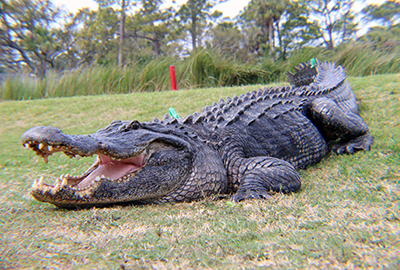The American alligator (Alligator mississippiensis) is an iconic species for wetlands of the southern United States. It is an apex predator that has long held the awe and respect of people who have had the opportunity to see it in its natural setting. It also is one of a few wild animals that has been condemned as a man-eater. As a result, alligators carry a stigma that generates fear and angst among many residents, especially when these animals venture into residential ponds.
Alligator populations are rebounding from their once threatened status. Their expanding populations are venturing into new habitats, and some alligators have found their ways into stormwater ponds. This is to be expected because stormwater ponds provide suitable habitat for alligators.

Alligators are opportunistic carnivores, taking advantage of available food resources. In stormwater ponds this predominantly means fish, turtles, and waterfowl. Alligators are typically shy and avoid humans and pets. In some cases, large alligators (>6ft in length) may become curious about small pets and children especially if residents are feeding them. Small alligators (<6ft in length) do not constitute a major threat, and in some cases actually may be helpful to leave in the pond because they will deter ducks, geese, muskrats, and beavers and cull unhealthy fish and turtles.
Alligators are a protected game species in South Carolina, and only individuals issued a permit are allowed to harvest them. If your community has deemed an alligator to be a significant nuisance, you should contact your local DNR office to acquire a permit.
Please read the following statement taken from the SC Dept. of Natural Resources DNR News, 17 July 2009.
"It is up to the landowner's discretion to determine if the alligator is considered enough of a problem to warrant the removal of the animal. Except in cases involving rare or endangered species, control of nuisance wildlife and animal damage is the responsibility of the individual property owner. DNR maintains a list of wildlife control operators that provides wildlife control services, and like most businesses, does charge a fee for this service. The amount charged is negotiable between the customer and the wildlife control operator, and will often depend on the distance traveled, number of trips required, time expended, and/or number of animals removed. The alligator permit is issued to the landowner and they can remove the alligator themselves, or have someone else such as a friend or neighbor do the work as a no-cost alternative to hiring a wildlife control operator. A list of wildlife control operators that have indicated that they will remove alligators for a fee is included with all alligator permits."
Contact
Call the following numbers if you have a nuisance alligator during normal business hours:
- (843) 953-9856 (in Charleston)—Berkeley, Charleston and Dorchester counties
- (843) 546-8119 (in Georgetown)—Darlington, Dillon, Clarendon, Florence, Georgetown, Horry, Kershaw, Lee, Marion, Marlboro, Sumter and Williamsburg counties
- (803) 734-3898 (in Columbia)—Aiken, Allendale, Bamberg, Barnwell, Calhoun, Lexington, Orangeburg, and Richland counties
- (843) 844-8957 (in Green Pond)—Beaufort, Colleton, Hampton and Jasper counties

